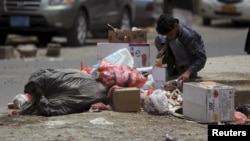Yemen’s war is having a devastating impact on the country’s children, putting millions of them at risk of malnutrition and preventable, potentially fatal diseases such as measles and pneumonia.
According to the U.N. Children’s Fund, at least 279 children have been killed and 402 wounded since late March, when Saudi Arabia began its air campaign against rebel Houthi forces.
UNICEF reported 318 children have been enlisted as soldiers, but said it believes the true number recruited to fight in this war is much higher.
While these figures are alarming, UNICEF spokesman Christof Boulierac said children also face increasing dangers from disease and malnutrition because they are not being vaccinated.
Because of the conflict, he said health centers do not have electricity or the fuel they need to keep vaccines cold. And many children also miss out on life- saving vaccinations because their parents often are too frightened by the fighting to take them for their shots.
“The tragic result of this situation is that children are going to die of diseases like measles and pneumonia that would normally be readily preventable," he said.
He said "the interruption in vaccination services is putting an estimated 2.6 million children aged under 15 at risk of contracting measles ... As you know, measles is a potentially fatal disease that spreads rapidly in times of conflict and population displacement.”
UNICEF said the number of children exposed to acute respiratory infections has more than doubled to 1.3 million since March. It attributed the dramatic increase to the inability to get children the treatment they need because hospitals and clinics are not functioning properly.
It said contaminated water, poor sanitary conditions, and the lack of oral rehydration salts are putting more than 2.5 million children at risk of diarrhea, which is often fatal.
Boulierac said malnutrition also is a growing threat.
“More than half a million children, more than 500,000 children under five years old will become severely and acutely malnourished over the next 12 months if the situation continues to deteriorate," he said. "Prior to the crisis, this estimate was 160,000 children suffering from ... severe, acute malnutrition.”
Boulierac said UNICEF and its partners are doing their best to vaccinate children and provide life-saving therapeutic feeding to acutely malnourished children.
But he said providing the care needed is an uphill battle, given that provisions of safe water, hygiene and improved sanitation are critical for preventing a public health crisis.




